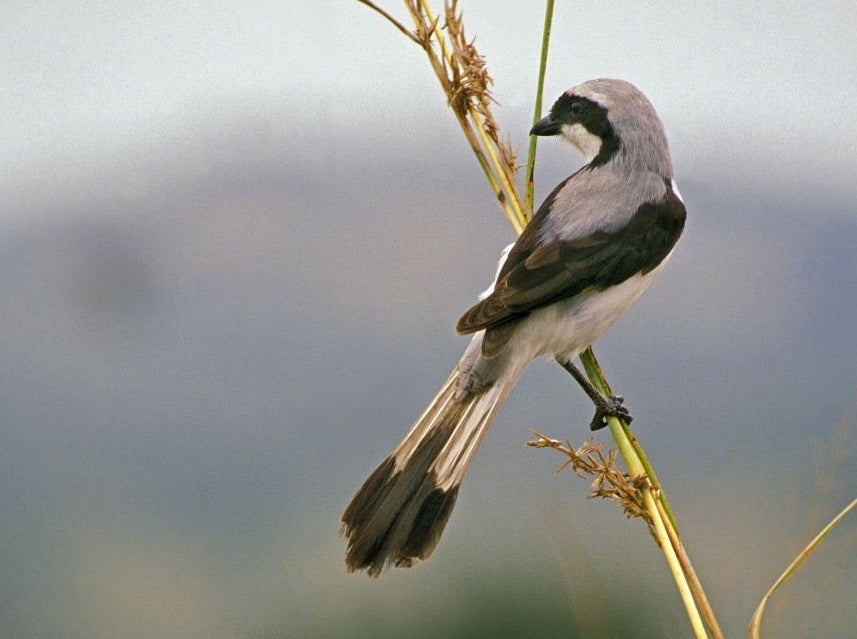So many shades of grey – but none is lovelier than this bird’s
The shrike is a scarce winter visitor to Britain, so keep your eyes peeled

Grey is not a colour with a lot going for it, really, is it? If there’s a primary association with it in our minds, it’s surely with the clouds that shut out the sun. Grey clouds not only take the blue out of the sky, on a truly dull day they take the blue out of the sea as well, turning it pewter. They send the Earth’s colours to sleep; they make the whole world monochrome.
Grey has many other disheartening associations. It is the ash of exhausted fires, and the hairs of old age. It is the colour of moral ambiguity, as in grey areas, perhaps even the colour of pessimism: if you want an example of this, look at a magnificent but deeply depressing poem of lost love by Thomas Hardy called “Neutral Tones” (for Googling purposes, the first line is “We stood by a pond that winter day”). It’s so gloomy, you might wonder why he wrote it, except that, as ever, Hardy’s music echoes in your mind:
The smile on your mouth was the deadest thing
Alive enough to have strength to die,
And a grin of bitterness swept thereby
Like an ominous bird a-wing…
Hard to believe then that grey in nature might on occasions be inspiring. But it can be, even if it’s a shade that isn’t often found: hardly at all in flowering plants, although it is the colour of the bark of the ash tree, bringing a lightness and grace to woodlands dominated by the murky trunks of oaks. (Pity the poor ash, with the Chalara fungus that’s going to kill it across Britain.) Grey is more common in insects, occurring in a number of moths, such as the attractive Continental immigrant, the Silver Y. Yet it comes into its own in birds.
Most of our gulls and terns have a similar colour pattern: they are grey to varying degrees on the back, and much paler, sometimes white, on their underparts. In species, such as the kittiwake and the common gull, this can be very pleasing, while in some of the terns, the grey is so soft and subtle that it is undeniably beautiful, most of all in the roseate tern, where the palest of grey backs sits above the palest of pink breasts in the loveliest of contrasts. (Pink is the best colour to be paired with grey, I realised many years ago, eating my sad bachelor dinners in a pink-and-grey Chinese restaurant in north London.)
However, it’s in a couple of songbirds that the attraction of grey reaches its peak. One is the bullfinch: the male has a brilliant vermillion breast, a black face, a grey back and a white rump, making him a good candidate for the single most handsome British bird. Yet somehow the female, whose breast is grey rather than red, is even more special, as I realised as a teenage birdwatcher: she is a charming combination of greys and blacks and whites, a study in restrained elegance like the famous self-portrait by Whistler, “Arrangement in Gray”.
But the best grey bird of all is a rarity in Britain, a scarce winter visitor: the great grey shrike. Shrikes are mini-predators, like tiny falcons, (although they are songbirds); we used to have one of our own, the red-backed shrike, which is now nearly extinct. The great grey breeds in the far north of Europe, and about 50 of them come here every autumn, with each one holding a territory through the winter, usually on a heathland. Like the female bullfinch, it’s a captivating combination of grey, black and white, with the added charisma which invariably attaches itself to a creature that kills. It’s just a terrific bird.
And I’ve never seen one. I have several times tramped for hours over a freezing heath where a great grey shrike was confidently said to be in residence; always in vain. I’ll be doing it again this winter, and so as grey November gets even greyer, I comfort myself with the curious feeling, that I may have something grey to look forward to.

Join our commenting forum
Join thought-provoking conversations, follow other Independent readers and see their replies